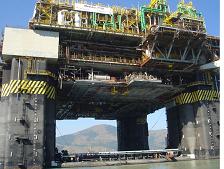 The British government is subsidising one of the world's largest and riskiest oil-drilling projects in the Atlantic Ocean and would be liable for tens of millions of pounds if a major accident took place.
The British government is subsidising one of the world's largest and riskiest oil-drilling projects in the Atlantic Ocean and would be liable for tens of millions of pounds if a major accident took place.
Documents seen by the Guardian show that UK trade ministers underwrote loans taken out by the Brazilian state-run energy company Petrobras in 2005 in order that Rolls Royce and other companies could contribute to the building of the giant P-52 platform.
The platform is now operating 125km off the coast of Brazil in 1,798 metres (5,900 feet) of water - deeper than BP's Deepwater rig that exploded in April and led to the disastrous oil spill in the Gulf of Mexico.
But the 14-page environment report prepared by the UK's Export Credits Guarantee Department (ECGD) and obtained under freedom of information rules by watchdog group Corner House, makes no mention of blowouts or the equipment needed to prevent them. Ministers have edited out all ECDG's comments assessing the risks involved in deep-sea drilling in the Atlantic.
The oil and gas reservoirs of the Campos basin are considered some of the most hazardous in the world to access, pushing offshore technology to the limit. The P-52 rig replaced one that exploded and sank due to human error in 2001, killing 11 people.
Environmental groups today accused the government of forcing British taxpayers to underwrite a project that could lead to a disaster similar to the spill in the Gulf of Mexico.
John Sauven, the executive director of Greenpeace, said: "In this newly declared age of austerity in which we're told we can barely afford schools and hospitals the government is underwriting investments in dangerous deepwater drilling, despite events in the Gulf of Mexico and the obvious climate change implications of supporting frontier oil exploration."
Margaret Ounsley, head of public affairs at WWF-UK said: "British taxpayers will be surprised to hear they are supporting this project. The ECGD is the shadowy arm of the British government and does nothing to make its procedures more open and transparent. We simply do not know what systems are in place to prevent an environmental disaster at this platform."
A ECGD spokesman confirmed the government was still responsible for underwriting the loans, but said that the risk of a blowout was slim because the oil was not under high pressure like the Gulf of Mexico, and the most dangerous time - when the well was being drilled - had passed.
"ECDG supported P-52 along with the US, Norwegian and Italian export credits agencies, who all undertook environmental assessments prior to supporting the project. ECDG assessed the P-52 project against international finance corporation guidelines for offshore oil and gas development and found it to meet the environmental criteria in these guidelines. Petrobras' oil-spill response plan was scrutinised against four international standards for such plans and was considered to be adequate for the project", he said.
Last week Petrobras said it expected offshore drilling rules in Brazilian waters to be tightened in response to the Gulf spill and following increased interest by foreign companies in deepwater drilling off its coast. In March, just weeks before the Gulf blowout, BP announced a move into deep-sea drilling of the Brazilian coast with a $7bn deal with US company Devon Energy Corp. The deal included exploration blocks where oil is believed to lie in waters as deep as 2,780m (9,120ft).
Yesterday the Brazilian government said it was still assessing whether the sale to BP should go ahead. The Agência Nacional do Petróleo, which grants licenses and supervises safety in the Brazilian oil industry, said that no decision has yet been taken on whether to approve what in normal cicrcumstances would be a formality.
(Published by The Guardian - June 30, 2010)